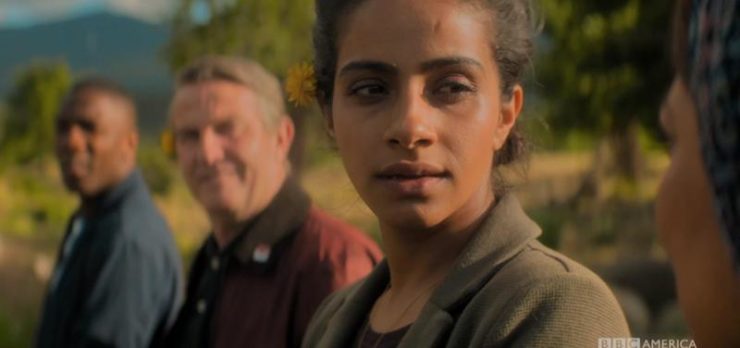If you like Doctor Who episodes that tackle history with thoughtful sensitivity, peek further into the lives of companions, and offer messages of love, family, and hope in the face of overwhelming adversity, then “Demons of the Punjab” will leave you with a full heart… but only after breaking it.
Summary
Yas is home with family celebrating her grandmother’s birthday. Her grandmother, Umbreen (Leena Dhingra), gives out gifts of old family mementos, and gives Yas a broken watch. She says that Yas must never repair the watch and refuses to tell her the story behind it. Yas asks the Doctor to take her back in time to learn more about her grandmother. The Doctor is hesitant, but the TARDIS can read the imprint of the watch, so she uses it to take them back in time. Once there, they meet a man named Prem (Shane Zaza) engaged to a younger Umbreen (Amita Suman). Prem is not Yas’s grandfather, but he is wearing the watch she was given in the future. It also turns out that they have arrived on the day that the Partition of India took place.
Prem’s brother Manish is against the wedding going forward because Umbreen is Muslim and they are Hindu; he is keen for the partition to separate India from Muslims. The Doctor and company discover that the holy man who was going to officiate Umbreen and Prem’s wedding has been killed by “demons” who Prem has seen before—when his older brother died at the end of their service in WWII. They find the demon ship in the forest and the Doctor recognizes them as a species of assassins known as Thijarians. She agrees to officiate the wedding to help it go forward, thought Manish is angry and Umbreen’s mother believes that Prem’s family is cursed. Then Thijarians teleport the Doctor to their ship and explain that they are no longer assassins; they are the last of their kind left after their world was destroyed, and no one witnessed the deaths of their people. Now they travel the universe witnessing the deaths of those who pass alone, honoring their homeworld. The Doctor apologizes for her misunderstanding, and they tell her that they are here to witness Prem’s coming death.
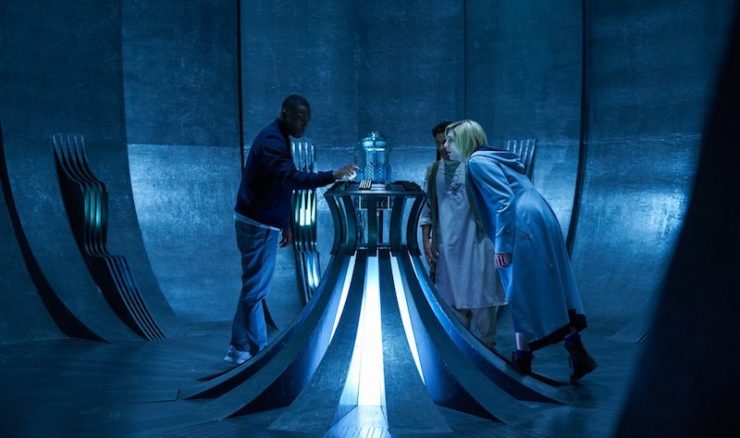
Ryan and Graham help Prem prepare for the wedding while he ruminates on how the people he has lived among his whole life are now bent on harming each other. Graham advises that all they can do in the face of violence and anger is do their best to be good men. The Doctor officiates the wedding, and has to tell Yas, Ryan, and Graham that they have to let Prem die or Yas will never be born. Prem offers his watch to Umbreen, but drops it as he gives it to her, and it breaks; Umbreen says that she loves it this way, and it will represent their moment in time. The Doctor confronts Manish, now knowing that he was responsible for the officiant’s death, but he is unrepentant and has brought men to the homestead to drive Umbreen and her family away. Prem tells Umbreen and her mother to escape and promises to follow, then goes to confront the men and his brother. He tries to talk them down, but they won’t be persuaded. The Thijarians appear to witness Prem as he is gunned down.
Back on the TARDIS, Yas makes certain that her grandmother survived. When she arrives home, she asks her grandmother if she’s happy with the life she led. Umbreen assures her that she is very happy because she has her daughter and granddaughters. She asks if Yas still wants to know about the watch, but Yas declines, saying she can tell her about it some other time.
Commentary
After waiting for more Yas-centered stories, we were finally given this gorgeous episode, written by Vinay Patel. There’s a lot to unpack here, running from the more personal side of history as it gets bound up in familial narratives to commentary on the humanity’s bend toward pursuing us-versus-them mentalities that only create more pain and harm. In seeing one particular side of India’s partition in 1947—in an episode that aired on Remembrance Sunday in the UK—we’re called to reflect on a past that isn’t as far behind us as we like to pretend.
Beginning with Yas and her grandmother Umbreen, there are two aspects at work; the first is the importance of Yas knowing where she comes from, appreciating the long road that led her grandmother to Sheffield, and learning about the life that came before. But it’s also about the point that all younger generations discover as they grow into their own lives; the realization that the elder members of your family had their own trials to weather long before you entered the picture, and that there may be parts of those experiences that they don’t know how to share with you. Yas is upset to learn that her grandmother lied about her past, but Graham is in a unique position to know a little about that, and is able to offer some perspective on why she should respect her grandmother’s right to offer these stories in her own time. Coming to understand that by the end, Yas is able to focus on the most important thing: the love that she feels for her grandmother and receives in kind.
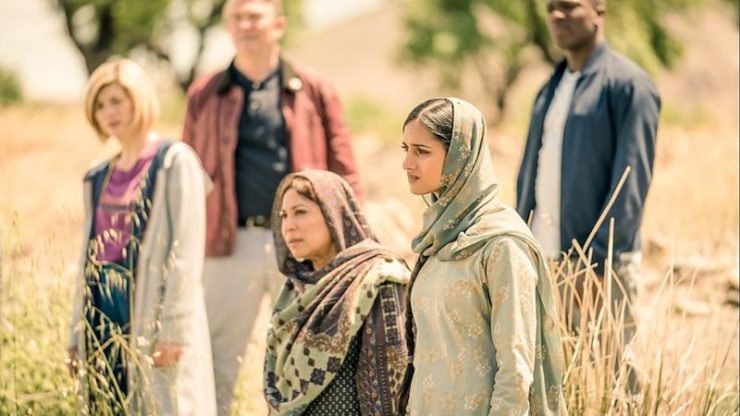
Other themes of the episode revolve around the breakdown of kindness and community created by political upheaval, war, and loss. The partition of India serves as the ground for examining how these divisions hurt people, but the message feels particularly timely just about anywhere you look in the world right now. Prem stands at the center of this fight, between the woman he loves who adheres to a different faith than his own, and a younger brother who has allowed extremist punditry to tarnish his view of the friends and neighbors he’s worked beside his whole life. This story is painful because it’s familiar—we’re seeing it play out every day, and everywhere.
This episode also serves as a potent reminder of the how the world as we know it was basically invented yesterday; in “Rosa”, Yas talks to Ryan about racial slurs she’s had to deal with while working, with hatred directed at her for being of Pakistani descent—and suddenly we’re reminded that Pakistan didn’t exist as a country until 70 years ago. We’re reminded that prejudice adapts to target anyone who “threatens” (often by just existing) a perceived status quo. If that doesn’t help put bigotry into perspective, it’s hard to imagine what will.
We’re seeing an emerging pattern of this particular Team TARDIS being asked to stand aside and allow history to unfold as it must. In this particular case, the Doctor has a personal reason to not want to interfere, which is the potential unraveling of Yas’s existence. But the fact we’re seeing this more often on the show reads as a pointed desire to respect the sacrifices made by people who struggle against real injustices. The Doctor can’t flip a switch and make everything okay whenever the world turns and people hurt. It’s a hard veer away from the legendary quality that the Moffat era prescribed, where the Doctor was always capable in his role as “the man who stops the monsters.” Thirteen’s tenure is marked by smaller instances of real pain and joy, and the need to witness them, to remember them.
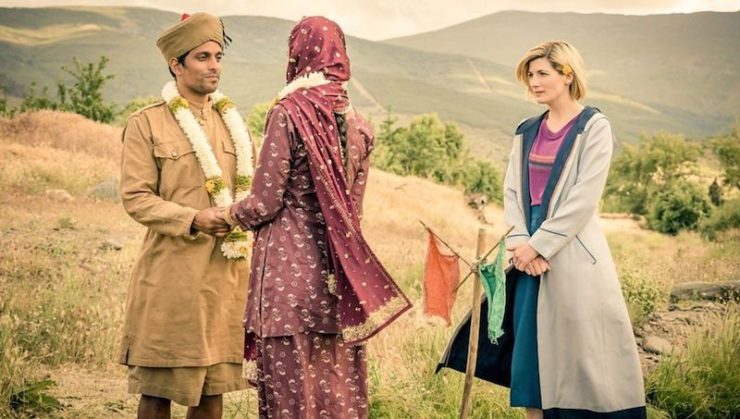
Speaking of witnessing, the introduction of the Thijarians was beautifully executed. I have a soft spot as is for aliens and creatures who appear to be threatening, but turn out otherwise. The idea of a planet full of assassins who become witnesses for the unseen dead as a result of the destruction of their own planet and people is a truly inspired concept. (I also love that the Doctor, true to her ego, assumes first that they’ve come to assassinate her, because that’s pretty much par for the course.) This is another theme that the season has revolved around; there are truly odious villains who we can spot in a heartbeat (Krasko, Robertson, Tzim-Sha), but the rest are just in need of a little compassion and understanding (the Pting, the spiders).
Up until the sober ending, the Doctor gets to have quite a bit of fun in this episode, from fiddling about in the TARDIS to conducting science in a barn to officiating a beautiful wedding. She also gets to experience henna, which is a wedding tradition for Indian women, noting that she never got to do this sort of thing back when she was a man. It’s all played a bit tongue in cheek, but Whittaker does an excellent job of bringing hints of vulnerability in these moments, and her playfulness as she comments on new female experiences never feels derisive or thoughtless. It would be nice to get more from her on that front, though it seems as though giving a little wink to it now and then is all they feel comfortable doing.
An extra thing to note is that we’re getting a sense of the schedule for Team TARDIS; it seems as though the Doctor is making sure to drop them off once every few adventures to get back to life and see family, etc. Similar to previous seasons (this was particularly true for the Ninth and Tenth Doctors), it doesn’t seem that we’re witnessing every adventure this group has together. It’s a nice bit of realism that also helps pad out the arcs and relationships—we won’t see every interaction, but the characters are capable of getting closer and developing a rapport faster, which is important in shows with shorter seasons that are meant to cover large swaths of time. Also, it’s nice to be reminded that not every adventure with the Doctor involves life-threatening peril… those are just the jaunts we tend to see.
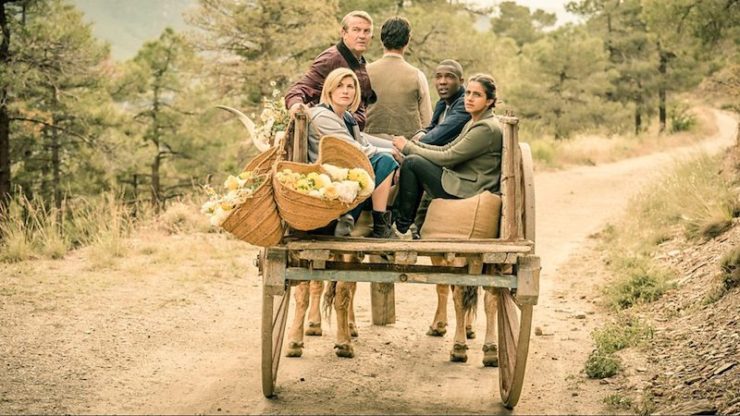
Bits and asides and some very cool extras for this week:
- Writer Vinay Patel tweeted out some of the books he read while researching for this episode, which you can check out if you’re interested in that trove of resources. He encouraged everyone to seek out more stories about partition, as this episode only contains one. Patel also tweeted out that in a case of extreme serendipity, he went to visit his grandmother before she left for India, and without knowing anything about the episode he had written, she gave him his dead grandfather’s broken watch. So. You know, when we say reality is stranger than fiction, it’s because it really is.
- The Doctor is dismayed to find that she awarded Ryan a gold star after offering points in the previous episode. I would not be sad if this became a running gag.
- The Doctor claims that she’s too kind because her predecessor told her to be, referencing Twelve’s speech just prior to regeneration. She also apparently officiated Einstein’s wedding.
- The Doctor knows that going to visit family members of companions in the past is a bad idea particularly because of how wrong it went when she took Rose to do it (in “Father’s Day,” though to be fair, it all turned out okay in the end).
- The soundtrack for this episode was gorgeous.
- We’ve seen several accounts of destroyed planets and peoples, and it seems likely that if there’s a season arc to be had, it probably revolves around this.
Emmet Asher-Perrin is heartily enjoying this Doctor’s love for biscuits. You can bug him on Twitter and Tumblr, and read more of her work here and elsewhere.










